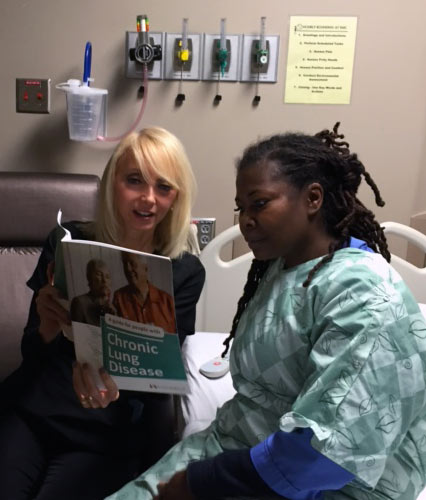 Although she is now managing her department, Karen Grice is still involved in sharing information about chronic lung disease with her patients.
Although she is now managing her department, Karen Grice is still involved in sharing information about chronic lung disease with her patients.In the 30 years she has spent in respiratory care, Karen Grice, BSRT, RRT, CPFT, has worked a lot of jobs — she’s been an assistant director of a small acute care facility, worked in the NICU, adult ICU, Neuro ICU, CVSU, and CICU, and served in the pulmonary function lab. Most recently — just last month, in fact — she was named manager of cardiopulmonary services at her current facility, Novant Health Kernersville Medical Center in Kernersville, NC.
She credits that promotion in part to the position she held at the hospital at the time — COPD/CHF navigator. In the following interview, she explains how she took on this innovative role in respiratory care and why she believes the disease navigator role is an important one for therapists to assume —
What led to your interest in disease management?
In my bachelor’s degree program, my Public Health class gave me a whole new perspective about the health care of society as a whole, rather than from the individual’s perspective. My organization has always been proactive in navigating the economic and political climates of health care, and recognized the need to address health care from a wellness perspective rather than from a “we’ll fix you when you get sick” perspective.
Population Health grew from the desire to improve the health of the entire population through education and self-management. That’s not to say that we don’t treat sick people. However, the premise is that if people are educated about avoiding and managing chronic diseases, they can make lifestyle changes to reduce the severity of effects from their disease and have a better quality of life. I have always embraced challenges and saw the opportunity to work in disease management a way to impact people’s lives and help them to make the necessary lifestyle changes.
What did it take to get the position as COPD and CHF navigator?
I completed my BSRT in 2014 and took the AARC COPD Educator Course in preparation for the role.
How were you trained for the position?
I was fortunate to have an education module that was developed at Novant Health Forsyth Medical Center (NHFMC). I went to NHFMC to shadow the COPD navigators and developed my own style of educating patients based on their model. I recognized the need for a CHF navigator at my facility, and with the approval of my manager, started CHF navigation at my facility. I shadowed the CHF nurse navigator at NHFMC to gain a better understanding managing CHF.
What did the job entail and what would you say were the biggest challenges and rewards involved with the position?
My job role encompassed staff scheduling, supply ordering, and performing PFTs and bronchoscopies, as well as educating patients. The biggest challenge in educating patients is getting through to those who believe that they already know everything about their disease. However, it is rare that a patient is not impacted in a positive way when they are shown the proper way to use their inhalers incorporating a spacer, or perform breathing exercises. The biggest rewards come when patients thank me and tell me “no one has ever taken the time to explain that to me.” Most patients are very engaged and grateful for the education provided.
What advice do you have for other RTs who might like to get more involved in the disease management area?
I would recommend the COPD Educator Course, as it gives a very comprehensive view of what COPD education is about. Shadowing a navigator was helpful for me since it provided a “real life” perspective of the workflow and the day-to-day activities of a navigator. For someone working in a facility that does not have a disease manager, don’t be afraid to be the first! Not only do the patients benefit, but hospitals benefit with reduced readmission rates. Speak to your manager about starting a program at your facility.





